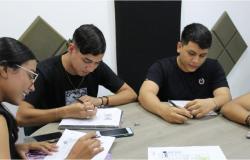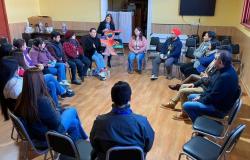
President Gustavo Petro in Ipiales, Nariño.
Photo: Joel_Presidencia
President Gustavo Petro attended the closing of the dialogue space of the regional consultation table of Los Pastos and Quillasingas, where the director of the National Planning Department, Alexander López, and the governor of Nariño, Luis Alfonso Escobar, were also present. In his speech, the president stated that they are “cornering” his government, so “the constituent power” of the people is necessary.
The head of state assured that with the communities in that region “greater execution has been achieved than with the rest of the country, but it is still missing.” These failures would require an analysis that “is important to determine the steps to follow in these remaining 26 months, which are fundamental,” referring to the time remaining in the Presidency. Petro has spoken before about the aspirations he has for his political project, which he hopes will keep him in power with a favorable result in the 2026 elections. Still, he has reiterated that he is not interested in seeking a re-election.
“When a people places itself in the position of deciding on a government or on the institutions of the State, it places itself in something called ‘constituent power.’ Constituent power has begun in Colombia. It is not, as journalists say, the Assembly [Constituyente]. That is another thing, they have confused it,” she declared. “Now it is about that promise becoming realities, that is, that change is not just another word, but rather a reality. That’s where we are now. That is why the constituent power of the people is needed more, because they are cornering us,” he expressed.
We suggest: Petro defended the use of M-19 symbols as something “agreed upon” with the Barco government
He also mentioned the 2016 peace agreement, which he noted was not “with the people,” but between “two bodies, both quite distant from the people: the State, in the name of the president [Juan Manuel] Santos and the FARC.” According to Petro, this would have been the reason why the ‘No’ won in the plebiscite: “they can cite the constituent power. Not us, apparently.”
Even so, he highlighted that the text had “three very intelligent axes derived from the experience of facing each other.” The first would be the agrarian reform, about which he stated that “it has not been fulfilled because the land cannot be obtained except voluntarily from its owners.”
“The Peace Agreement is being breached, that is, Colombia’s commitment to humanity,” he indicated.
You may be interested in: Opposition questioned “procedural defects” in the debate on the pension reform in the Chamber
The second axis would be the transformation of the territory, in which he questioned that the money that was transferred to OCAD Paz—the body of the General Royalties System in charge of managing investment projects that contribute to the implementation of the Agreement—had not been executed. At that point, he announced the creation of a Nariño regional agreement table so that the Government and social organizations can oversee these resources.
“Let’s start, and that is called constituent power, without fear, in the south of Colombia, so that it expands throughout Colombia, let’s start the regional agreement table of Nariño with the social organizations in such a way that you, with the national budgets that We are going to deliver to you, with the data from the national budget that you already know from the departmental and municipal budgets that have to do with investment, those resources will be made available to the table of social organizations of the department of Nariño and that table will be representative of popular organizations, those that determine the priorities on which this resource is spent. Not the Government, but the people.”
Finally, he spoke about the “judicial truth” and questioned whether justice in Colombia is not as agile as the American justice system was in issuing a verdict on Chiquita Brands.
Also read: De la Calle criticized millionaire CNE contracts: “It’s real nonsense”
“Why is it the United States justice that reaches the truth and not the Colombian justice? Why wasn’t it the Prosecutor’s Office, which had the obligation to take the paramilitary process in Urabá to the bottom of the judicial truth, and, therefore, the accusations and confessions that the paramilitaries themselves made regarding the role of this North American company that today the justice of the United States accuses and condemns? Because the prosecutor was Néstor Humberto Martínez, because the one who governed justice was the ‘cartel of the toga’, because after the excellent Supreme Court of Justice, which originated the process of parapolitics, and took 35% of the Senate to jail “What followed was a corrupt and paramilitary takeover of justice in Colombia and these characters then covered up the truth,” he asserted.
The president concluded his intervention by pointing out that these three axes have been breached because “the oligarchy in Colombia is not capable of reaching a national agreement to change the norms” that allow the implementation of the Peace Agreement.
“That’s why they want to overthrow the government of change, they were scared of the people. Well, the people have to express themselves, because they are going to try to corner the Government and the Colombian people have to not only stop them, but also decide on these axes that benefit the majority of the Colombian population,” he concluded.





